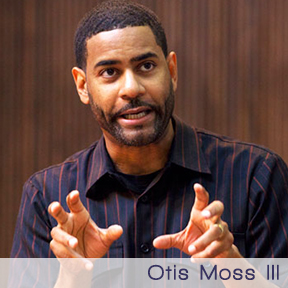
Rev. Dr. Otis Moss III, who is joining us at Wild Goose Festival for the first time this summer, is the Senior Pastor of the 8,000-member Trinity United Church of Christ in Chicago, “preaching a Black theology that unapologetically calls attention to the problems of mass incarceration, environmental justice, and economic inequality.”
As a recipient of the 2016 NAACP Chairman’s Award, Dr. Moss was named one of 5 trailblazing leaders under the age of 50 who have “given voice and vision to the mantra that black lives matter.” He is also an author, activist, filmmaker, and as he says of himself on his Twitter profile he’s a “Jazz-influenced Pastor with a Hip-Hop vibe. Saved by Jesus, inspired by Zora Neale Hurston, blessed by Howard Thurman and amazed by August Wilson.”
Last week he took some time to answer a few questions for us.
WGF: In your recent book Blue Note Preaching in a Post-Soul World, you talk about how if the church wants to be prophetic we need to understand the blues — we need to learn to sing the blues. You say: “America is living stormy Monday, but the pulpit is preaching happy Sunday.” Why do you think that is?
OM3: The Church has been the chaplain to the Empire instead of the prophet for the oppressed. We’ve collectively been an arm of the Empire – forgive my Star Wars movie references – but the Church forgot it was supposed to be a part of the Rebel Alliance. Instead, we’ve bowed down to the Emperor and to the Sith Lords of Wall Street. This was not always the case. Christianity was born out of marginalization. It was a faith that challenged the Roman Empire. But in America, Christianity has rarely, if ever, challenged the Empire. When that challenge has happened, it comes from the marginalized communities, whether it’s black or Latino, the women’s suffrage movement, the labor movement. These communities that are connected to Christ challenge the Empire and reclaim the essence of Christianity as being a faith connected to love and justice.
WGF: Why has this happened? Why has the Church largely become the “chaplain to the Empire”?
 OM3: We have faith but not love. When you solely focus on a faith dimension, devoid of love, you create doctrines that can be dangerous and destructive to people. You can be faithful…and hateful. As Paul states about faith, hope, and love, the greatest of these is love. Jesus says we are to love the Lord with all our hearts, mind and strength and love our neighbor as ourselves, and all the scripture, all the prophets hang on this statement. This is where the Christian church has fallen to the dark side by saying we are a faithful community but not being a loving community. When you are devoid of love you support policies and ideologies of people who are in power who are solely seeking to stay in power.
OM3: We have faith but not love. When you solely focus on a faith dimension, devoid of love, you create doctrines that can be dangerous and destructive to people. You can be faithful…and hateful. As Paul states about faith, hope, and love, the greatest of these is love. Jesus says we are to love the Lord with all our hearts, mind and strength and love our neighbor as ourselves, and all the scripture, all the prophets hang on this statement. This is where the Christian church has fallen to the dark side by saying we are a faithful community but not being a loving community. When you are devoid of love you support policies and ideologies of people who are in power who are solely seeking to stay in power.
WGF: A lot of people say 11 am Sunday morning is the most segregated hour of the week. Do you think it’s possible for different kinds of people in terms of race, culture, socioeconomics and sexual orientation to worship and serve together?
OM3: White supremacy is in many ways the religion of America and one of the aspects that prevents diversity — white churches have difficulty with diversity. It’s easy for people of color to be a part of a “white church” because we understand the dynamics of being in a diverse world and dealing with different people. The great challenge is: can people who call themselves white be a part of a community when they’re not the majority, or central to the leadership? That’s the rub right there. So the “diverse churches” that we claim in America, they’re usually pastored by white men. But the opposite rarely ever happens. The challenge has really never been on the marginalized side. The challenge has been for those who idolize white supremacy and refuse to put it down. As Jim Wallis has said, “If I’m to be a Christian, I’m going to have to cease being white and accept that I’m a child of God. My whiteness is preventing me from living out my Christianity.”
WGF: Even though you ended up as a pastor, you started out studying cinematography in college at Moorehouse. It’s been interesting to see how filmmaking continues to play a big role in your life. A couple years ago, for example, not long after Michael Brown’s death at the hands of police in Ferguson, Missouri, you led a team that came up with the powerful video “Get Home Safely: 10 Rules of Survival.”
OM3: Figuring out how to merge media and ministry and activism has always been my passion. So we’ve created a production company at Trinity, Unashamed Media Group, to produce short films and documentaries. Our most recent one, “A Letter to My Son” is based on a letter that I wrote to my son Elijah that ended up on Huffington Post. After the death of Philando Castille last summer, I wrote this letter expressing my love and concern for my son as young black man. It’s about what he needs to know from his father…that though the world is open to him it’s also extremely dangerous for a person of color. We’ve created a short film around that, utilizing the letter but with parents from our community saying the words as they’re talking to their children. It’s a letter to my son, but it speaks to the needs and fears of so many parents.
WGF: Trinity has a very intergenerational congregation and unlike a lot of churches these days, includes a lot of Millennials. Why do you think so many Millennials seem to have given up on church?
OM3: It’s because the Church has, in many ways, chosen to be chaplains to the Empire and because the Church has suffered from horrendous PR. The Church is beholden to primarily white evangelicals who have claimed to be the Moral Majority but have been more like the Immoral Minority, and they have framed what the Church is to be. As a result Milliennials, who are deeply hungry for spiritual connection, do not recognize the Church being connected to Jesus. I preached a sermon a while back entitled, “I love Jesus but I can’t stand the Church.” I received so much feedback from Millennials about that sermon. They said, “That is it! I love Jesus. I just can’t stand the Church. The Church represents judgment and racism and homophobia, classism and patriarchy, but when I look at Jesus, Jesus is love and justice and fighting for equality, Jesus is demanding that I not only become a better person but that I engage the world. And I just can’t deal with the cognitive dissonance that is happening, this disconnection between Jesus and the Church.”
WGF: So, in some ways, Millennials leaving the Church is a wake up call. They are rejecting what being a Christian or being in the Church has come to mean.
OM3: Yes, we may have to stop saying we’re Christian and just say we’re followers of Jesus. Because the Church is meant to be a Luke 4:18 community. The spirit of the Lord should be upon us to preach good news to the poor, freedom for the oppressed, recovery of sight for the blind, and to proclaim the year of Jubilee for everybody.
Join Rev. Dr. Otis Moss III this summer at the Goose.








